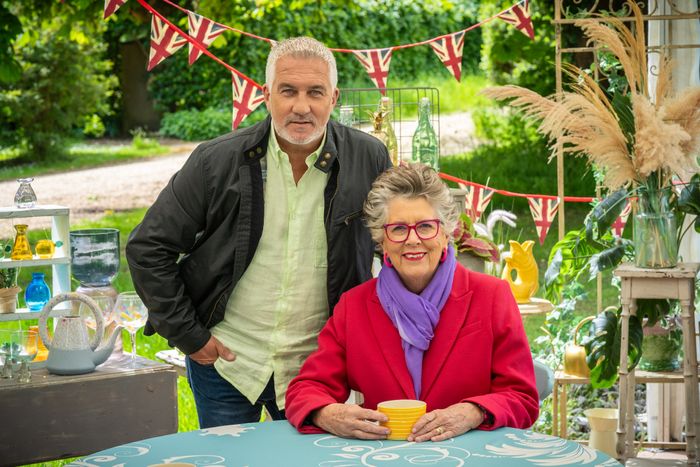
“Still never tried this flavoring you put into it,” Paul Hollywood mused, turning The Great British Baking Show contestant Dylan Bachelet’s gochujang-and-garlic rolls over in his hand. Baked to perfection and pleasantly orange, the rolls resembled little pumpkins. “It’s chile?” fellow judge Prue Leith asked. “It’s like a fermented chile paste,” Bachelet clarified. The judges were astounded. “The flavor is so much in your face,” Hollywood told him before extending a hand for an infamous (and increasingly common) “Hollywood Handshake.” Bachelet would go on to take home Star Baker, largely owing to his use of an ingredient otherwise not usually found in the tent. The confused tweets poured in.
“Screaming at Paul Hollywood, a man who’s [sic] job is cooking, being shocked by the mystical magical never been used before flavour of … gochujang,” said one viewer. “How come paul hollywood couldn’t pronounce ‘taco’ and has never heard of gochujang but kept calling it ‘choritho,’” asked writer Claire Carusillo. The old-fashioned nature of The Great British Baking Show — watch these bakers of varying skills finagle their way through traditional English recipes with bits of flair — once felt like a perk rather than a flaw, but the show’s dedicated audience is growing frustrated with the judges’ dated tastes. Gochujang has been mainstream in the U.S. for nearly a decade; in 2015, Bon Appétit declared the Korean chile-pepper-and-soybean paste the “hottest hot sauce on the market,” and a 2022 recipe for gochujang-caramel cookies by Eric Kim wound up on the New York Times “Cooking” section’s list of its 50 Greatest Hits (only a few trackpad scrolls down from his recipe for gochujang buttered noodles). While The Great British Baking Show doesn’t mirror United States food media — to its general benefit — the idea that an established chef wouldn’t know the flavor of gochujang is hard to grasp. As one Reddit user put it, “It’s not that obscure in the UK either. It especially shouldn’t be to a restaurateur. It was the trendy chef ingredient a few years ago. I remember watching one of the cooking competitions (probably MasterChef or Great British Menu) and getting tired of hearing it.”
That Hollywood and Leith haven’t been as inundated — as, say, a Brooklyn-based, potluck-attending type may have — with gochujang roast chicken is not entirely unsurprising but a sign that The Great British Baking Show’s judges have fallen out of pace with the general eating public. Despite theories that Hollywood’s naïveté is actually meant to serve as exposition for the audience, comment after critique after national-themed-week controversies demonstrated that the program is struggling to find its modern identity. Early seasons of The Great British Baking Show celebrated English tradition with familiar recipes, but as its contestants and challenges have grown more international and creative, the formulaic judging lags behind. There is, of course, one clear solution to this: It’s time to add another judge.
As the age gap between the GBBS competitors and judges grows, so too will the ingredients vary and diversify. The contemporary crop of bakers was raised, in part, on the internet and sees TikToks and recipe Reels and knows all about butter alternatives and flax and aquafaba, to say nothing of dragon fruit and hibiscus and pandan. That Hollywood or Leith might not know the taste of a cured egg yolk needn’t be shocking, but their continued skepticism about unexpected additions weighs the show down. A disastrous “Vegan Week”–themed episode from series nine had both judges confused about the taste of nutritional yeast, though neither balked at the tofu-and-soy-milk ice cream Giuseppe Dell’Anno fed them in the “Free-From Week”–themed episode of series 12. While the show seems to sneak in challenges that celebrate alternative ways of eating and cooking, watching the judges engage and evaluate those foods feels a bit like watching them eat a plate of broccoli: They chew and swallow, brows furrowed, with little enjoyment. (Hollywood, especially, was keen to describe vegan sausage rolls he did enjoy as “buttery” — as if to suggest a dish made without butter should aspire to a butterlike flavor rather than its own thing) There’s a frustrating binary to the use of “untraditional” ingredients as it stands now on GBBS: Different can either be tremendous and winning or strange and bad, and it’s impossible to predict whether a big swing will befuddle or delight.
This isn’t to say that Leith and Hollywood are incapable of doing their job because of their age. But their particular stature and values continue to hold the show back from dramatic and delicious potential. For one, the Baking Show participants and audience have come to know these judges’ flavor preferences like the back of their hand —Leith likes booze, Hollywood doesn’t like peanut butter, and both show disinterest in the “grassy” flavor of matcha — and adjust their recipes accordingly. When Georgie Grasso cooked a rather traditional Bakewell tart in Pastry Week’s signature challenge this season, the judges fawned over her adherence to convention. Sure, a standard dessert baked right can be a treat, but the bakes are intended to be personalized. (And other contestants, like Gill Howard and her chocolate-hazelnut profiteroles, have been downgraded for playing it safe.) For a show that has evolved to reward and encourage spectacle in design and originality in lieu of “how things are done,” there ought to be one evaluator who can represent that. What Baking Show instead increasingly feels like is trying to pick out a movie to show your parents and hoping the final choice doesn’t offend anyone.
That a number of Great British Baking Show winners and finalists go on to publish cookbooks and become internet personalities rather than restaurateurs (like Leith) or celebrity chefs (like Hollywood) reflects the modern business of cooking and eating, but there’s one place former contestants haven’t popped up — and that’s back in the tent to judge. Why not? Who knows better than those who have already run the gauntlet, like past winners Dell’Anno or Nadiya Hussain? Remember Chigs? Let’s get Chigs back in the mix. Each season, The Great British Baking Show gathers bakers from across Britain who can bake, sure, but they bake for tastes that are often more adventurous than the judges’ staid palates. The judges are meant to be experts: people who not only know how to bake these treats but know how to eat them, too.
More From This Series
- Anatomy of a Great British Baking Show Flameout
- The 41 Best Reality Shows on Netflix
- The Great British Baking Show Recap: Just Desserts


